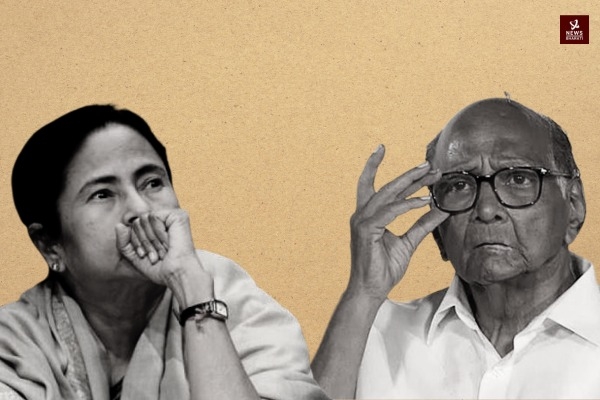NB Explains | ECI withdraws national party status of TMC, NCP & CPI; here's what they lost
Meanwhile, the ECI granted national party status to the Delhi chief minister Arvind Kejriwal-led Aam Aadmi Party (AAP) ECI took this decision under the Election Symbols (Reservation and Allotment) Order, 1968, which stipulates the criteria for recognition as a national or state party.
Total Views |
Ahead of the upcoming Loksabha election 2024, the Election Commission of India gave a major blow to Sharad Pawar and Mamata Banerjee and withdrew the national party status of the All India Trinamool Congress, Nationalist Congress Party (NCP) and the Communist Party of India (CPI).

Meanwhile, the ECI granted national party status to the Delhi chief minister Arvind Kejriwal-led Aam Aadmi Party (AAP) ECI took this decision under the Election Symbols (Reservation and Allotment) Order, 1968, which stipulates the criteria for recognition as a national or state party.
Apart from it, the Commission also revoked the state party status granted to RLD in Uttar Pradesh, BRS in Andhra Pradesh, PDA in Manipur, PMK in Puducherry, RSP in West Bengal and MPC in Mizoram.
Before going further, let's first understand how does a party get the tag of a National Party?
- A registered party is recognised as a national party only if it fulfils any one of the following three conditions
- 2% of seats in the Lok Sabha from at least three different states
- 4 Loksabha seats + 6 % votes shares in 4 states
- Recognition as a state party in four states
It should be noted that, apart from these norms, ECI also reviews their performance in the last 2 elections. This time too, EC’s decision was based on a review of the parties’ poll performances — the 2014 and 2019 Lok Sabha polls and 21 state assembly polls since 2014.
The Election Commission amended a rule on August 22, 2016, under which it will now review the national and state status of political parties every ten years instead of five
Aam Aadmi Party (AAP) is recognized as a national party. The status of NCP, CPI and AITC as a national political party has been withdrawn. NCP and AITC will be recognized as state parties in Nagaland and Meghalaya respectively: Election Commission of India pic.twitter.com/o6SDuhDFdg
— ANI (@ANI) April 10, 2023
As per the rule if we look at AAP, then besides Delhi, Goa and Punjab, AAP became a state party in Gujarat after the 2022 Assembly elections where it secured 12.92% of the votes.
While talking about TMC, in the review EC found out that the TMC did not contest the 2019 Lok Sabha elections from Arunachal Pradesh and Manipur, and got 0.40% and 43.28% of the votes in Tripura and West Bengal respectively. In the Assembly polls from 2016 to 2018, the party’s vote share was 44.91% in West Bengal, 1.41% in Manipur, and 0.30% in Tripura. In the most recent polls, the party got 48.02% of the votes in West Bengal (2021) and did not contest in Manipur (2022).
Meanwhile, the NCP lost its state party status in Goa, Manipur and Meghalaya as its vote share was 2.28%, 0.95% and 1.61% respectively, in the Assembly elections between 2017 and 2018. It remains a state party in Maharashtra, where it polled 16.71% of the votes in the 2019 Assembly elections. The party was also given state party status in Nagaland based on the Assembly elections earlier this year.
What are the perks of being a National party?
- It allows an organisation to get a common poll symbol across the country
- Recognized 'State' and 'National' party requires only one proposer to file nominations
- The recognized 'state' and National Parties are given two sets of electoral rolls free of cost by the Election Commission.
- The National parties receive land or building from the government to establish their party office.
- Free air time on national broadcasters for election campaigns.
- National parties can have up to 40-star campaigners while others can have up to 20-star campaigners.
After loosing National party status, now TMC, NCP, CPI will not able to take the perks.
What is next?
After losing the national party status, TMC is exploring legal options to challenge the decision of the Election Commission, a party source said.
Currently, how many national parties are in India?
The country now has six national parties BJP, Congress, Bahujan Samaj Party (BSP), CPI(M), National People’s Party (NPP) and AAP.


